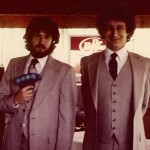Today, as I was dealing with the fact that Weingarten is trying to write a humor column about several people he knows who have died recently, suddenly and tragically (yes, I did say a HUMOR column), I read this in the New York Times. It’s funny how irritating it is to hear 40-year-olds whining about confronting their mortality when you’re 55. But aside from that bias, is there really anything irritating about this Judith Warner column? Yes, I think. There’s a certain smugness throughout, perhaps most acutely in the following phrase:
It’s just that urgency that goes, in early middle age. All that yearning and anguish and passion had been replaced by a steady pulse of pleasure and satisfaction . . .
That blows the irritation fog horn. Primarily for blindly assuming that reaching middle age automatically comes with “a steady pulse of pleasure” — ignoring the obvious truth that her steady pulse has more to do with being an upper middle class professional with a whole lot of luck on her side than attaining the age of 40.
Anyone doing first-person writing has to be very careful about explicitly generalizing his or her own experience to everyone else, especially when wallowing in personal good fortune. Then to compound that error by COMPLAINING about one’s good fortune, as Warner does here, is really hard to forgive.


 Let me be direct. “The Good Soldiers” by David Finkel (Sarah Crichton Books/FSG) is the most honest, most painful, and most brilliantly rendered account of modern war I’ve ever read. I got no exercise at all the day I gulped down its 284 riveting pages.
Let me be direct. “The Good Soldiers” by David Finkel (Sarah Crichton Books/FSG) is the most honest, most painful, and most brilliantly rendered account of modern war I’ve ever read. I got no exercise at all the day I gulped down its 284 riveting pages.
